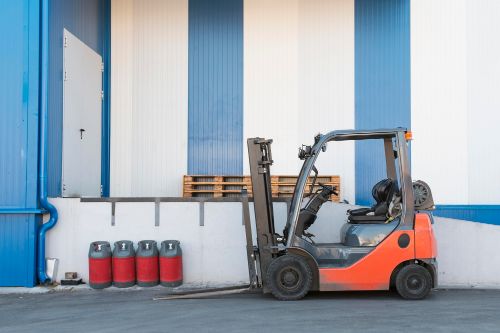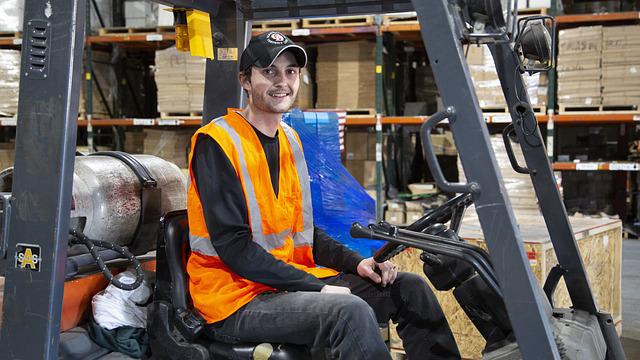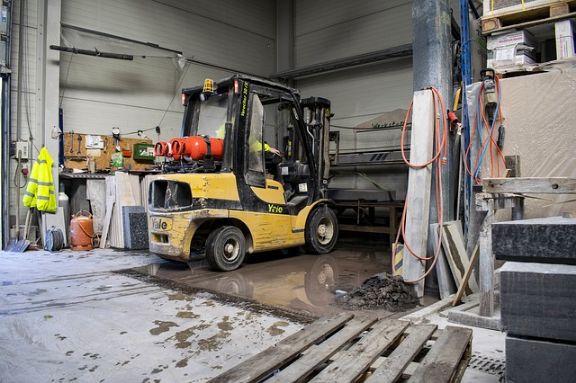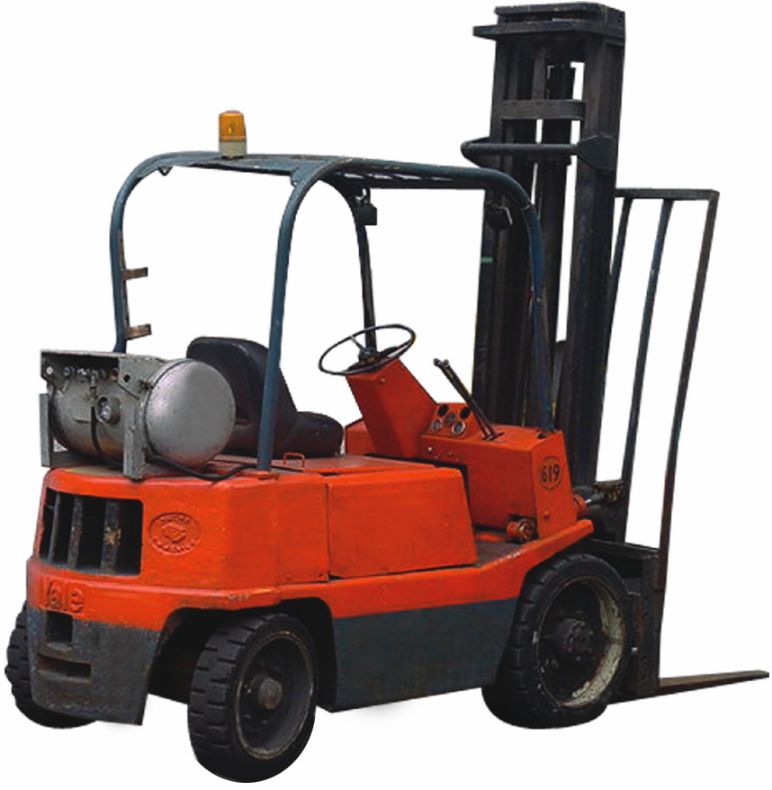
Do you have a large number of propane-powered forklifts in your workplace? If so, I know you’re storing a large number of propane tanks as well.
Because of the volatile nature of propane gas, tanks have to be handled with extreme caution. Propane tanks are bulky and dangerous to store. You may now be wondering can you store forklift propane tanks inside?
We should not give a personal opinion on this matter because this question, although basic and simple, requires a correct answer because there is a safety risk involved in storing forklift tanks indoors.
To answer that question if forklift propane tanks can be stored inside, yes, forklift propane tanks can be stored either inside or outside the building or facility. However, the OSHA 29 CFR 1910.110 standard has to comply with, especially the 1910.110(f)(4)(i) and 1910.110(f)(5) regulations that specifically specify guidelines in the storage of propane tanks inside the building and room.
In addition to this, the NFPA 58 Liquefied Petroleum Gas Code has its own provision with regard to this matter. To read this Code, visit this page. There are two (2) chapters that tackle this subject: 5-3.1 Storage within Buildings Frequented by the Public and 5-3.2 Storage within Buildings Not Frequented by the Public (Such as Industrial Buildings).
The OSHA regulation and the NFPA code don’t only discuss the safe storage of propane tanks indoors but also outdoors. So whatever you’re planning in your facility, it would be proper to refer to those rulings in order to comply. You won’t be having a hard time obeying those laws because they are almost identical.
At the end of the day, we all want a better and safer workplace where workers are protected from the inherent danger of handling and storing forklift propane tanks in the workplace.
Alternative Safe Storage Solutions for Forklift Propane Tanks
When considering how to store forklift propane tanks, it’s crucial to find the best method that ensures safety while meeting your specific needs. While many choose indoor storage, you might want to consider the following alternative storage methods for their distinct advantages.
Outdoor Storage Facilities
Storing your forklift propane tanks outdoors offers the advantage of natural ventilation. Any minor leaks will dissipate quickly into the atmosphere, reducing the chance of dangerous gas accumulation. Also, you’ll find that outdoor storage provides easier access for quick inspections, maintenance, and emergencies.
Moreover, with tanks outside, you can free up valuable indoor space for other operations. When opting for outdoor storage, it’s essential to use a well-ventilated cage or secured area to deter unauthorized access. Regularly check the tanks for signs of wear due to weather conditions and ensure that the storage area remains clear of flammable materials.
Underground Storage Options
Placing your propane tanks underground can shield them from external factors like weather and direct sunlight. This storage method offers a more stable temperature, reducing pressure fluctuations inside the tanks. Besides, with tanks stored underground, the risk of theft or unauthorized access is minimized.
Above ground, your space remains usable for other purposes. When using this storage method, it’s crucial to ensure your underground space is watertight with adequate drainage. Consistent checks for potential damage or wear and ensuring a mechanism to release any gas build-up are also paramount.
Specialized Storage Units with Enhanced Safety Features
If you’re considering investing in storage solutions, specialized storage units designed explicitly for propane or similar gases might be the way to go. These units often come with built-in gas detection and monitoring systems, keeping you alerted to potential leaks.
Some even offer climate control features, ensuring the tanks are always at an optimal temperature. Plus, these robust units provide solid protection against potential external impacts. As you use these units, regularly test the monitoring systems for functionality, and always adhere to manufacturer guidelines to ensure maximum safety.
Read related article: Forklift Propane Tank Exchange (Cost, Where to Fill These Cylinders)
How Much Liquefied Petroleum Gas Can Be Stored Indoor on the Job Site?
Again, this is another tricky question that requires an appropriate reply. Because of the volatility of the LP gas, it is a good safety practice to follow the quantity on how much can be stored in the facility or job site.
Let us again refer to OSHA 29 CFR 1910.110. In the said standard, there are two categories of storage, namely: buildings not frequented by the public and special buildings or rooms. In the latter category, the allowed quantity of LP gas that can be stored should not exceed 10,000 lbs; while in the former category, the quantity should not exceed 300 pounds (approximately 2,550 cubic feet in vapor form).
The NFPA Code chapter 5.3.2 (building not frequented by the public) says that the allowable quantity of LP gas in one location should not exceed 735 lb (334 kg) water capacity while in chapter 5.3.1 (building frequented by the public), the maximum quantity of LP-gas should not exceed 200 lb (91 kg).
With these figures in mind, you can now construct storage of tanks on the job site for safety and security.
Read related article: Replacing Service Valves on Forklift Propane Tanks: Short Guide
Potential Risks of Indoor Storage of Propane Tanks
When choosing to store forklift propane tanks indoors, it’s crucial to be aware of the inherent risks. Understanding these risks is the first step in establishing safety measures to mitigate them. Let’s delve into the potential dangers you should be cognizant of.
Risk of Gas Leaks and Accumulation
- Rapid Gas Release: Forklift propane tanks, if damaged or improperly sealed, can leak. Rapid gas release can lead to an increased risk of explosions or fire if an ignition source is present.
- Heavier than Air: Propane is denser than air, which means it will sink and settle at the lowest points in a room or facility. Such accumulation in confined spaces without proper ventilation can be hazardous.
- Explosive Range: Propane has a wide explosive range. In air, the gas can ignite in concentrations as low as 2.1% and as high as 9.5%. This makes even small leaks in an enclosed space a significant risk.
Propane’s Behavior in Confined Spaces
- Lack of Dispersion: In open spaces, propane dissipates relatively quickly. But in confined indoor spaces, without adequate ventilation, it can accumulate rapidly.
- Pressure Build-up: If propane is leaking within an enclosed space, the build-up can lead to an increase in pressure, potentially causing structural damage or even explosions.
- Cold Burns and Frostbite: If liquid propane escapes and comes into contact with skin, it can cause cold burns or frostbite due to its extremely low boiling point.
Impact on Air Quality and Health
- Displacement of Oxygen: As propane accumulates, it can displace oxygen, leading to a decrease in breathable air. This can result in symptoms like dizziness, shortness of breath, and even asphyxiation in extreme cases.
- Toxic Fumes Upon Combustion: If propane burns in an area with insufficient oxygen, it can produce carbon monoxide, a deadly gas that is odorless and colorless. Inhalation of carbon monoxide can lead to headaches, dizziness, vomiting, and in severe cases, death.
- Odor Fatigue: Propane in its natural state is odorless, but an odorant is added to help detect leaks. Continuous exposure to this smell can lead to “odor fatigue,” where you become desensitized and might not notice a leak.
Best Practices for Indoor Storage of Forklift Propane Tanks (If Permitted)
Storing forklift propane tanks indoors requires a meticulous approach to safety. If indoor storage is permitted in your region, you’ll want to ensure that you’re following the best practices. Here’s a guide to help you make sure that your indoor propane storage is as safe as possible.
Proper Ventilation Requirements
- Continuous Airflow: Ensure that the storage area has a system that continuously replaces the air. This will help dissipate any minor leaks that might occur, preventing dangerous gas build-up.
- Exhaust Fans: Installing exhaust fans near the ceiling can help in removing any propane that might escape, given that propane is heavier than air and can accumulate at lower levels.
- Regular Air Quality Checks: You should routinely check the air quality in the storage area. Any indication of propane in the air means there might be a leak that needs attention.
Appropriate Storage Containers and Cages
- Secured Storage: Using sturdy cages or containers ensures the tanks are safe from accidental bumps or knocks. It also acts as a deterrent against unauthorized access.
- Upright Position: Always store forklift propane tanks in an upright position. This position ensures the relief valve operates correctly and prevents liquid propane from blocking it.
- Away from Heat Sources: Ensure that your storage containers or cages are placed away from direct heat sources or sunlight. Excessive heat can cause pressure inside the tank to rise, leading to potential risks.
Regular Inspection and Maintenance Schedules
- Daily Checks: It’s a good practice to visually inspect the storage area daily. Look out for any signs of leaks, damage to the tanks, or unusual odors.
- Monthly Inspections: Conduct a more detailed monthly inspection, checking for signs of wear, corrosion, or damage on the tanks and the storage containers or cages.
- Annual Maintenance: At least once a year, have a professional inspect and maintain the tanks. They can check for issues that might not be immediately visible and ensure that all safety mechanisms are functioning correctly.
- Document Everything: Keep a logbook for all inspections and maintenance activities. This documentation can help in identifying patterns, understanding recurrent issues, and ensuring compliance with safety regulations.
If you’re storing forklift propane tanks indoors, remember that vigilance and adherence to best practices are key. By ensuring proper ventilation, using appropriate storage solutions, and maintaining regular inspection schedules, you can significantly reduce the risks associated with indoor propane storage.
Other Ways to Handle Propane Tanks – To Avoid Accidents
Safe handling of forklift tanks and other cylinders is oftentimes not given importance in workplaces I had been. They’re just thrown around, knocked over, and even put somewhere else. This should not be the case. Below are some of the safety guidelines and practices you can follow in handling and storing these bottles:
- Give your workers, especially those with the responsibility of refilling or exchanging tanks, specific training in the safe handling of propane tanks. You can contact a training provider in your area and send the workers to their facility to attend the training; or if you have a large number of workers, hire a third-party instructor to conduct the training onsite – onsite training is the most preferred way of delivering safety training to the workers.
- Follow the allowable propane gas quantity that can be stored in one location. And always adhere to the OSHA standard and NFPA Code in the construction of storage and handling of LP gas. These standards and codes have been set forth to protect workers from accidents and business owners from hefty fines and penalties in the occurrence of accidents in the workplace.
- Fire and explosion is the common accident when dealing with propane tanks – appropriate quantities and types of fire extinguishers must be provided near the storage location. The keyword here is “near”; it would be advisable to install an appropriate number of firex inside the storage itself.
- Cylinders should be labeled accordingly. What does it mean? If you have many tanks and cylinders containing other gases, each bottle should be labeled for easy identification. In that way, propane or other gas would not be used accidentally in other applications.
- Regular inspection of forklift propane tanks should be done. This is to eliminate bad potatoes from the rest of the cylinders. If you notice significant corrosion, dents and damage, that tank should be set aside for inspection. Recertification is to be done when the expiration is due.
- Storage should be away from flammable materials and the source of ignition. This is pretty much self-explanatory. Smoking is prohibited when working inside the storage or when exchanging tanks.
- Where there is a smell of rotten eggs, there is a good chance that there is a leak somewhere in the connection. The possible location of the leak is in the hose or valve. To check for leaks, use foamy soap when a detector is not available.
- When storage is outdoors, it should be at least 20 feet away from any opening of the nearest building. In NFPA Code, the opening that is referred to in the previous sentence is any door, entrance, exit, window, or vent. When indoors, the storage should not block the entrance/exit, passageway, or corridor that is normally used by people in an emergency.
- Manual handling training can be given to operators and workers involved in the storage and handling of these big bulky bottles. The intention of the provision of such training is to prevent workers from suffering an injury in manual handling.
- Fire regulations vary from state to state, it is recommended to contact your local fire marshall for consultation when constructing tank storage.
- follow the regulations in your state about storing propane tanks in apartments an other similar complexes.
Handling and Transporting Forklift Propane Tanks Inside Facilities
Managing a facility that houses or uses propane requires an intricate understanding of safety. Moving and transporting forklift propane tanks indoors, even more so. If not handled correctly, the consequences can be severe. Here’s a guide for you on how to safely move propane tanks indoors and what steps to take if there’s an accidental leak or spill.
1. Safe Methods of Moving Propane Tanks Indoors
- Use Proper Equipment: Always use designed hand trucks or carts to transport propane tanks. Ensure that they’re in good condition and can securely hold the weight of the tanks.
- Keep Upright: Forklift propane tanks should always be transported in an upright position to prevent the relief valve from being submerged in liquid propane, which could lead to over-pressurization.
- Secure the Tanks: While transporting, ensure that the tanks are securely fastened to prevent any movement, especially sudden jolts that could cause damage.
- Clear the Path: Before moving a propane tank, make sure the path is clear of obstacles. This not only speeds up the process but also reduces the risk of accidents.
- Limit Transport Distance: Minimize the distance over which propane tanks have to be moved indoors. The shorter the distance, the lower the risk.
- Stay Vigilant: Always have at least one person supervising the move. This person should be trained to recognize and respond to potential hazards.
2. Procedures in Case of Accidental Leaks or Spills
- Evacuate Immediately: If you suspect a leak, evacuate the area immediately. Propane is heavier than air and can accumulate, leading to potential explosions.
- No Sparks or Flames: Ensure that there are no open flames, sparks, or electrical devices in operation near the leak. Turn off all equipment and lights to reduce ignition risks.
- Ventilate the Area: If safe to do so, open windows and doors to disperse the gas. This helps in reducing the concentration of propane in the air.
- Shut Off the Source: If you can identify and safely reach the source of the leak, shut it off. But only if it’s safe.
- Do Not Re-enter: Once you’ve evacuated, do not re-enter the facility until it has been declared safe by professionals.
- Call for Help: Inform local fire departments or emergency services immediately. If your facility has a safety team or emergency response team, alert them as well.
- Document the Incident: After the situation is under control, document everything. This is crucial for understanding what went wrong and how to prevent it in the future.
In conclusion, when you’re handling and transporting propane tanks indoors, always prioritize safety. Regularly review and practice these safety protocols with your team to ensure that everyone knows what to do in case of emergencies. Remember, preparedness can make all the difference when seconds count.
Read related article: Forklift Propane MSDS: What Does the Document Contain?
Educating Your Forklift Operators and Other Staff on Propane Safety
In any workplace that deals with hazardous materials like propane, your team’s safety is paramount. A key to ensuring this safety is the education and awareness of your staff. Let’s dive deeper into why you should prioritize training on propane safety and the resources you can tap into for effective training sessions.
1. Why You Should Train Your Team on Propane Safety
- Knowledge of Risks: Propane, while widely used, is a highly flammable gas. If your employees are unaware of the potential hazards, they could inadvertently adopt practices that risk leaks or even explosions.
- Being Proactive: Proper training allows your team to spot and handle potential hazards before they turn into full-blown crises. It’s always better to be proactive rather than reactive.
- Fostering a Safety Culture: When your employees are educated about risks, they’re more likely to follow best practices. This not only keeps everyone safe but helps in building a culture where safety is everyone’s priority.
- Staying on the Right Side of the Law: Many jurisdictions have stringent regulations around propane handling and storage. By training your team, you’re ensuring compliance and steering clear of potential legal issues.
- Empowering Your Employees: Knowledge is power. When your team knows how to safely handle situations, it boosts their confidence, making your workplace more efficient and harmonious.
2. Resources You Can Use for Effective Training
- Industry Associations: Organizations like the National Propane Gas Association (NPGA) or the Propane Education & Research Council (PERC) can be valuable allies, offering specialized resources and training materials.
- OSHA’s Guidance: OSHA provides comprehensive guidelines on propane safety. These can serve as the foundation for your training program.
- Local Fire Departments: Consider reaching out to your local fire departments. They often have insights into local regulations and can offer training sessions on handling flammable materials like propane.
- Online Training Modules: There are numerous online courses tailored to propane safety. Incorporating these into your training allows your employees to learn at a pace that suits them.
- Hands-on Workshops: Nothing beats practical experience. Organizing workshops that simulate real-life situations can be incredibly beneficial, ensuring your team is ready for the real deal.
- Regular Refresher Sessions: Safety training isn’t a one-off event. Make sure to schedule regular refresher courses to keep your team up-to-date.
To wrap it up, the safety of your workspace is a direct reflection of the knowledge and awareness of your staff. With a substance as unpredictable as propane, you can’t afford any oversights. Prioritizing comprehensive training shows your commitment to the safety and well-being of your team.
To Summarize This Article
It is important for companies to keep the storage forklift propane tanks organized and in a safe space. If the tanks are stored outside, they get exposed to extreme weather and corrosion. This may be the reason why many opted to store them inside.
When storing them indoors, it is recommended to follow the best safety practices because propane is dangerous and highly combustible. The last thing we don’t want to happen is an accident such as an explosion that could lead to serious injury and damage to property.
Let us reiterate this, forklift propane tanks can be stored inside and they can be also stored outdoors – wherever your preferred location might be.

Mike is an experienced propane technician with over 15 years of professional experience in the field. He has dedicated his career to helping customers with their propane needs, from installation to maintenance and repair. Together with Jeremy, he co-founded this website to provide useful information and guidance to customers seeking reliable propane services.



